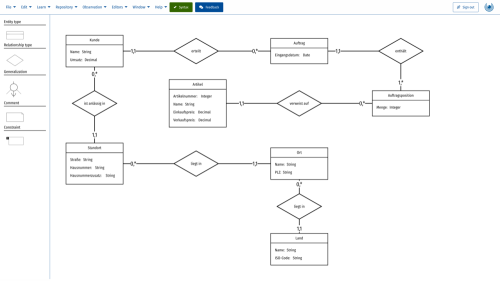Research Project
TOOL – A web browser-based modeling tool and research observatory
- Projektleitung:
- Prof. Dr. Stefan Strecker
- Mitarbeitende:
-
Sven Christ, M.Sc.
Philip Winkler, M.Sc. - Status:
- laufend
- Projektbeteiligte:
- Prof. Dr. Kristina Rosenthal
Research on TOOL started in 2014 by Prof. Strecker. Benjamin Ternes, M.Sc. was the lead developer from 2014 to 2022 and developed most of the present TOOL source code, and collaborated with more than 50 students on code development subprojects. Starting in 2019, we consider TOOL production-ready for teaching and research purposes. Currently, we work on a revision of the graphical editor for BPMN diagrams, and on improving our NLP-based learning support component.
Nutzen Sie TOOL!
Mit TOOL erstellen Sie konzeptuelle Datenmodelle und Geschäftsprozessmodelle im Webbrowser. TOOL unterstützt das Modellieren und Modellieren lernen durch Lernen im Modell und Lernen am Modell. TOOL ist gleichzeitig ein Forschungsobservatorium zur Untersuchung u.a. von Modellierungsschwierigkeiten und Lernbarrieren. TOOL ist Ergebnis mehrjähriger Forschung und Entwicklung und weiter Gegenstand laufender Forschungsprojekte (Forschungspublikationen zu TOOL; Themen für Abschlussarbeiten zu TOOL). TOOL steht allen Studierenden und Mitarbeitenden der FernUniversität unter https://tool.fernuni-hagen.de zur Verfügung (VPN-Verbindung erforderlich).
Nehmen Sie an unseren Studien zu TOOL teil!
Nehmen Sie an unseren laufenden Studien zu Modellierungsprozessen konzeptuellen Modellierens teil - wir suchen Studienteilnehmerinnen und -teilnehmer für Online-Studien (virtuell per Zoom) und für Präsenzstudien. Wir freuen uns über Ihr Interesse – kontaktieren Sie uns unverbindlich per E-Mail: tool
What is TOOL, really?
In a nutshell, TOOL is a web application with a JavaScript-driven user interface (Web-browser-based frontend) and a Java EE (Enterprise Edition)-based server backend. Presently, TOOL implements two graphical modeling editors: (1) An editor for a variant of the Entity-Relationship Model (ERM) for data modeling and (2) an editor for a subset of the Business Process Model and Notation (BPMN) for business process modeling. For supporting modelers in general as well as learners of conceptual modeling in particular, the TOOL prototype implements an ad-hoc syntax validation to point to modeling errors as well as a feedback component to guide the modeling process by making recommendations for sensible and adequate labels based on Natural Language Processing (NLP) techniques.
TOOL is not only a graphical modeling tool designed to make modeling processes more productive. For studying individual modeling processes both under laboratory conditions as well as in online settings, TOOL implements multi-modal observation and data generation techniques complementing different modes of observation of individual modeling processes. Currently, TOOL allows for (1) tracking modeler-tool interactions as timed-discrete events for visualizing modeling processes as heatmaps, dot diagrams, and to allow for stepwise replays of those interactions individually and in comparison with other modelers’ tracked interactions, (2) recording verbal data protocols of modeler’s thinking out loud following the tenets of think aloud research methods (including remotely in online studies), and (3) pre- and post-modeling surveying of studied subjects, e. g. about their prior modeling experience.
TOOL has been applied to both teaching and learning conceptual modeling, e.g., in university courses as well as to research studies on individual modeling processes, e.g., at the University of Hagen, the Universitat Politècnica de València, Spain and the Katholieke Universiteit Leuven, Belgium.
 Photo: https://er2020.big.tuwien.ac.at/awards/
Photo: https://er2020.big.tuwien.ac.at/awards/
TOOL – A Modeling Observatory & Tool for Studying Individual Modeling Processes by Benjamin Ternes, Kristina Rosenthal, Stefan Strecker and Julian Bartels
ER 2020 Best Paper Award in the Demo & Tool Category
 Photo: (c) FernUniversität in Hagen
Photo: (c) FernUniversität in Hagen
Publications
- Ternes B; Rosenthal K; Strecker S (2020) User Interface Design Research for Modeling Tools: A Literature Study, in EMISAJ – International Journal of Conceptual Modeling, 16, https://doi.org/10.18417/emisa.16.4.
- Ternes B; Rosenthal K; Strecker S: Automated Assistance for Data Modelers: A Heuristics-based Natural Language Processing Approach, in Proceedings of the 29th European Conference on Information Systems (ECIS 2021), accepted for publication.
- Ternes B; Rosenthal K; Strecker S; Bartels J: TOOL–A Modeling Observatory & Tool for Studying Individual Modeling Processes, in Demo Track at the 39th International Conference on Conceptual Modeling, ER 2020, TU Wien, Vienna, Austria, Nov 3–6, 2020.
- Ternes B; Rosenthal K; Barth H; Strecker S: TOOL–A Modeling Observatory & Tool: An Update, in Joint Proceedings of Modellierung 2020 Short, Workshop and Tools & Demo Papers, Vienna, Austria, February 19–21, 2020, CEUR-WS, Vol. 2542, pp. 198-202.
- Rosenthal K; Ternes B; Strecker S: Understanding individual processes of conceptual modeling: A multi-modal observation and data generation approach, in Modellierung 2020, Vienna, Austria, February 19-21, 2020.
- Rosenthal K; Strecker S: Toward a Taxonomy of Modeling Difficulties: A Multi-Modal Study on Individual Modeling Processes, in Proceedings of the 40th International Conference on Information Systems (ICIS 2019), Munich, Germany, December 15–18, 2019.
- Ternes B; Strecker S; Rosenthal K; Barth H: A browser-based modeling tool for studying the learning of conceptual modeling based on a multi-modal data collection approach, in Proceedings of the 14th International Conference on Wirtschaftsinformatik. Siegen, Germany, February 24–27, 2019, S. 1998–2002.
- Ternes B; Strecker S: A web-based modeling tool for studying the learning of conceptual modeling, in Schaefer I, Karagiannis D, Vogelsang A, Méndez D, Seidl C (Hrsg.) Modellierung 2018, Braunschweig, Gesellschaft für Informatik e.V., S. 325-328, 2018.
- Ternes B: Design and evaluation of a web-based modeling platform to support the learning of conceptual modeling and of studying the corresponding learning processes, in Proceedings of 8th International Workshop on Enterprise Modeling and Information Systems Architectures (EMISA) co-located with the 29th International Conference on Advanced Information Systems Engineering (CAiSE), Essen, Germany, S 138–142, 2017.
Talks
- Strecker S; Rosenthal K: Studying the learning of conceptual modeling: A learning observatory based on multi-modal data collection, in 1. Workshop on Teaching and Learning Conceptual Modeling, IFIP WG 8.1 Working Conference on the Practice of Enterprise Modelling (PoEM 2018), Wien, 31.10.2018.


